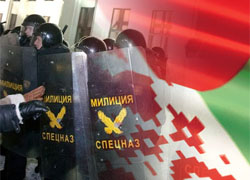Belarus: inside Europe's last dictatorship
23- Sigrid Rausing, The Guardian
- 8.10.2012, 14:36

Belarus is stuck in the Soviet past, under the grip of a brutal regime. But a few dissidents still cling to the small hope that things will improve.
On 23 September, there were elections in Belarus. Alexander Lukashenko's supporters won every seat. Lukashenko, formerly a state farm director, has been in power since 1994, presiding over the last dictatorship in Europe.
I was there in the early summer, to visit Chernobyl. We stayed mainly on the Ukrainian side, but had received permission to enter the "alienated zone" in Belarus. So much of the former Soviet Union feels depopulated and abandoned compared with the west, but near the Chernobyl zonethat feeling gradually intensifies. We drove for hours along empty roads lined with birch and pine, abandoned houses dotting the landscape. On the Ukrainian side, old men and women worked on small plots, raking hay into stacks. Some people have drifted back into the zone, but there are no young people there, and there won't be for hundreds, maybe thousands, of years to come: the radiation is too dangerous.
Eventually we reached the border between Ukraine and Belarus. Our permission to enter the "alienated zone" in Belarus was rescinded, and I went to the capital, Minsk, a five-hour drive on a straight road through endless forests and past vast collective farm fields, a landscape so relentlessly flat, so unchanging from beginning to end, that only an autocratic centralising regime could have produced it.
Most of Minsk was destroyed in the second world war; it is now an entirely modern city. Modern architecture in the west is so piecemeal in comparison – a mixture of individual buildings with no obvious relationship to each other, or uninspired housing districts for the poor. Minsk is a city that only could have emerged from total war, and in a political system of excessive state control, a vision of a dystopian future.
That evening I met Andrei Sannikov and his wife, journalist Iryna Khalip. He was the presidential candidate who was imprisoned after the crackdown in December 2010, following the presidential elections. He was sentenced to five years but was released, after international pressure, 16 months later. Iryna received a suspended sentence and is still under curfew. The police come to check on them every night, sometimes several times a night.
We met in the home of friends in an anonymous block of flats. The poky lift carried us creakily upwards. A woman looked at us curiously. We sat in the small kitchen. Andrei spoke of his imprisonment and his fading hope for democracy. He had black shadows under his eyes; Iryna, also, looked so tired. I was tired too. None of us could eat much of the Russian feast in front of us, though we did drink the Georgian wine. Quite soon they had to leave to be back in their own flat in time for the curfew.
I went on to a rehearsal at the Belarus Free Theatre, the dissident Belarussian theatre group. Its headquarters are a tiny suburban house. Inside, two modest rooms have been thrown into one – the owner smashed down the internal wall with a sledgehammer to give the company more space. The actors rehearsed their piece; a dance of dictatorship with no lines, only hums and sudden, discordant screams. I talked to some of the performers afterwards. They were young, engaged and alternative – we might have been in Berlin or New York, rather than Europe's last dictatorship.
The group's founders, Natalia Kaliada and Nikolai Khalezin, are political refugees in London. It was easy to forget the political reality, but later, after they showed me what was left of old Minsk – a handful of buildings survived the war – a nebulous political fear descended on me. I lay on the bed in my hotel room thinking about the epic sweep of Soviet repression, the hope after 1989, which faded with the post-Soviet political violence; beatings, abductions and murders. I thought, most of all, of Oleg Bebenin, Sannikov's press secretary and close friend, founder of the Belarussian citizens' rights group Charter 97, who wasfound hanged at his dacha in 2010 with unexplained bruises on his hand, chest and back. We had talked about him earlier. I thought about how easy it is for governments to kill people. "They threatened me too," Sannikov said. "I had no reason not to believe them."
In 1999, Gennady Karpenko, the leader of the opposition to Lukashenko, died, either of a cerebral haemorrhage, or of poison. Jury Zacharanka, the former minister of internal affairs who had joined the opposition, disappeared the same year. So did Victor Gonchar, opposition politician, and Anatol Krasouski, a businessman who was with him that evening. A year later, cameraman Dmitriy Zavadski disappeared. They are all presumed dead, victims of Lukashenko's regime. The owner of the flat where we met, a man in his 60s, kissed my hand as we left. He had told us earlier about being beaten not so long ago near the entrance of the block. "Don't bother to call the police," one of his attackers said. "We are the police."
Sigrid Rausing, The Guardian










